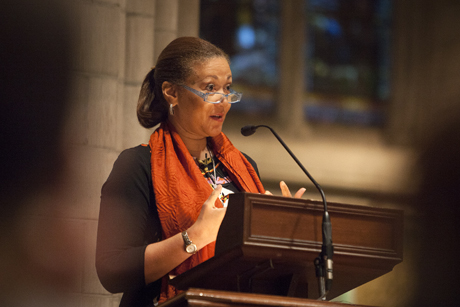Norris' family secrets led to insight into race in America
By Mark Ezzo

Originally setting out to explore the changes in America’s discussion about race as a result of Barack Obama’s election as president, Michele Norris’ 2010 book, “The Grace of Silence,” became an “accidental memoir.”
Norris, a National Public Radio host and special correspondent, spoke to an audience of more than 200 in Sage Chapel Feb. 4 when she delivered Cornell’s annual Martin Luther King Jr. Commemoration Lecture.
She recalled that King was not always as revered a figure as he is today. Actually, Norris discovered that her own father, a son of Birmingham, Ala., and a military veteran, saw King as a rabble-rouser.
“It’s difficult to look back on history and march forward. I realized that on a very personal level when working on my family memoir,” said Norris. “With every step I take, I try to understand the transformation my country has gone through.”
Once hesitant to tackle the topic of race relations in the newsroom for fear of pigeonholing herself, Norris is pleasantly surprised that the topic has become the staple of her portfolio.
“I so appreciate the opportunity to swim in these waters, because I have such a deeper understanding of this thing that unites and divides us,” said Norris.
Sometime around 2006-07, the idea of America becoming “post-racial” in the wake of Obama’s candidacy caught Norris’ attention. She traveled the country to discover that people were talking and thinking about race in a different way.
“Suddenly, older African-Americans were shedding stories, as if they were entering periods of historic indigestion,” said Norris. She attributed their doing so to the fact that they could pick up a newspaper and see a photo of someone in the Oval Office who could be a member of their own family.
“And all these stories had come out and I learned about a different America that they had tried to keep from me,” said Norris. “I was shaped by my parents’ silence. I originally wanted to write what others thought about race, but that changed when I learned my family’s secrets.”
One of those secrets was that Norris’ grandmother worked as a traveling Aunt Jemima performing pancake demonstrations. Another secret her uncle confessed when discussing young people who take the right to vote for granted: Norris’ own father was shot.
Her father was trying to attend a night class about the U.S. Constitution in the face of Alabama’s short-lived Boswell Amendment, enacted in 1946 to prevent African-Americans from registering to vote. African-American military men could be quizzed on the Constitution before being allowed to register to vote.
During her research she discovered her father had asserted his right to enter a classroom building against the advice of a police officer and was subsequently shot. “What stood between he and that building was a piece of his manhood,” said Norris.
Although Norris never had the opportunity to discuss the incident with her father, she did get the chance to talk to many other returning servicemen about mistreatment after serving a country that “didn’t love them back.”
“They kept similar stories to themselves because they wanted the next generation to soar,” said Norris. “If you want the generation to soar, you don’t put boulders in their pockets because it may weight them down. I used this book name because it was such an incredibly graceful act.”
Mark Ezzo ’14 is a writer intern for the Cornell Chronicle.
Media Contact
Get Cornell news delivered right to your inbox.
Subscribe